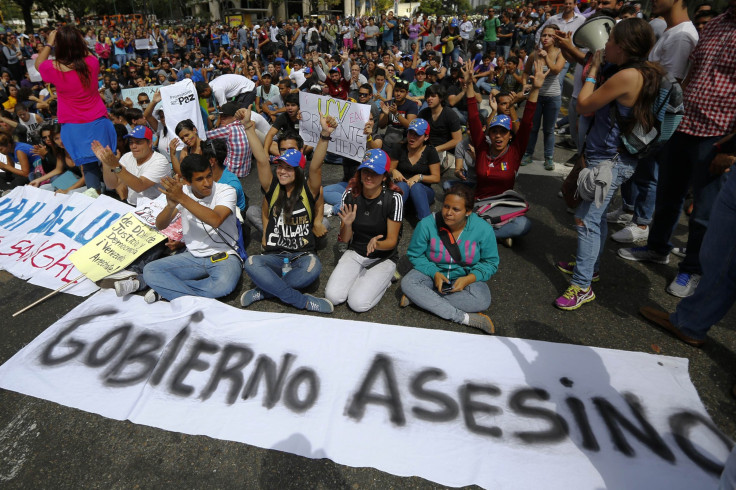Inflation, Crime And Incendiary Rethoric: The Numbers Behind The Angry Protests In Venezuela

MEXICO CITY -- It feels like it had been brewing for the whole of last year, and it is finally here: Venezuela has blown up into a street war. In the last week, three people have died, several have been injured, the media has been silenced, and nobody is willing to take responsibility.
What started as a peaceful demonstration last Wednesday, a joint effort by the political opposition to President Nicolás Maduro and the student body of Caracas, turned bloody when a confrontation between the protesters and police devolved into tear gas and gunshots. The government quickly blamed the opposition and proceeded to block access to Twitter pictures and local press recounting of the events.
The protest should not have come as a surprise. Venezuela has been dealing with rampant inflation, severe shortages, and the most devalued currency in Latin America. But as much as Venezuelan citizens need someone to blame, this situation is not entirely Maduro’s fault either. His spiritual and political father plays a large part.
“Like most things in modern Venezuela, it goes back to [late President Hugo] Chávez,” wrote Zack Beauchamp, editor of the Think Progress blog, who has been closely following Venezuelan politics.
Chávez, who passed away on March 6, 2013, left Venezuela in a weakened state for his elected successor, die-hard Chavista Maduro. Annual headline inflation was 22.1 percent in February 2013, according to numbers by the Venezuelan Central Bank later validated by independent analysts, such as FocusEconomics. Inflation only got worse over the course of the year, ending with a whopping 56.2 percent annual inflation in 2013. The government had predicted it would be at just 16 percent. This year looks no different, with prices rising 3.3 percent month-over-month in January, with an annual inflation of 56.3 percent.
Crime, which has always been one of Venezuela’s core problems, did not feature prominently in either Chávez’s or Maduro’s agendas, though it certainly should have. With 45 victims per 100,000 residents, Venezuela ranks fifth in the United Nation’s world list of most dangerous countries, far higher than 31 victims per 100,000 people in Colombia (12th) and 22 in Mexico (21st).
The recent assault and murder of a former beauty queen in Caracas, and the demonstrations asking for better safety measures in the whole country, brought the issue to the attention of Maduro’s administration, though no specific steps have been taken yet.
Even the national currency, which Chávez focused on stabilizing with a fixed rate, has been suffering the past 12 months. The Venezuelan bolivar held the dubious honor of being Latin America’s most devalued currency against the U.S. dollar in 2013, dropping 31.72 percent. The current official exchange rate is 6.3 bolivars per $1, but the black market ranks much higher, sometimes charging as much as 29 bolivars per dollar.
But what really tested Venezuelans' patience in the past week was Maduro’s inability to own up to his government's failures. In the last six months, Chávez’s successor has blamed the opposition, the U.S., private business owners and the opposition again for the economic and political problems of the country. He has tried to call on national pride, bringing up Chávez’s name at any opportunity and even trying to institute a college degree course in Chavismo.
And indeed, Venezuelans responded to the appeal to national pride, but in a completely different way than the government intended: by taking to the streets, and demanding change in the political sphere and a stop to the economic roller-coaster.
The opposition – which initially started the movement though later stepped back when it turned violent – is now being prosecuted as instigators of civil unrest. Voluntad Popular (People’s Will party) leader Leopoldo López has been ordered to surrender to the Venezuelan police and walk into prison for the deaths of two students and an officer. López responded by uploading a video to his Twitter account asking for society to march with him to the Ministry of Justice on Tuesday.
“I will not hide,” he said, asking protesters to escort him for a fraction of the walk peacefully.
The U.S. has also had its share of the blame, with Caracas expelling three diplomats off Venezuelan soil – the third episode of this nature in less than a year. The U.S. Department of State released a statement saying that it had yet to receive official written confirmation on the expulsion, and denied having anything to do with the protests. “We are deeply concerned by rising tensions, by the violence surrounding this Feb. 12 protest and by the issuing of a warrant for the arrest of opposition leader Leopoldo López,” State Department spokeswoman Marie Harf said of the events.
International institutions, like the United Nations and the European Union, have asked Venezuela to conduct “peaceful dialogue” and respect freedom of the press and the right to protest. Organization of American States Secretary-General, Chilean José Miguel Insulza, has requested an end to the violent confrontation.
Those who have kept quiet, however, have been Venezuela’s neighbors. Until Monday, the rest of Latin America had yet to make any comments on the situation shattering the country – and the only official statement released to date has not spoken in favor of peace.
The members of economic alliance Mercado Común del Sur (Mercosur), to which Venezuela also belongs, issued a common comment on Monday commending full support to Maduro and his government.
The statement, made public by the Argentinean Foreign Ministry and signed by Brazil, Uruguay and Paraguay, rejected “all sorts of violence and intolerance that attempt to destabilize the democracy in Venezuela, without regards to what its intentions were.” It does not mention Leopoldo López nor the casualties of the movement, but ask of both parts to “keep deepening the dialogue on national problems, in a democratic and rule of law, just as President Nicolás Maduro Moros has been promoting in the last few weeks.”
© Copyright IBTimes 2024. All rights reserved.





















